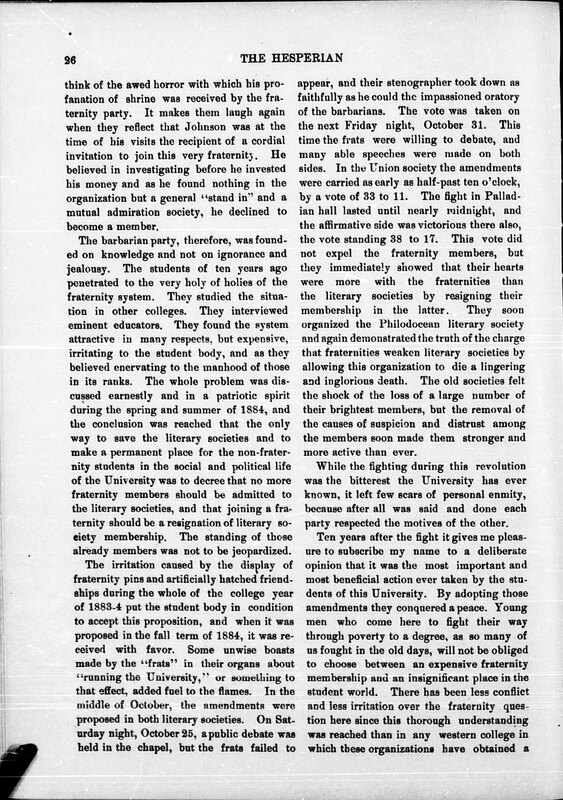THE BARBARIAN REVOLT.
Item
-
Title
-
THE BARBARIAN REVOLT.
-
Source
-
The Hesperian
"RG 38/01/02"
Periodical: Box: 3
Folder:
Archives and Special Collections, University of Nebraska-Lincoln Libraries
-
Rights
-
To inquire about usage, please contact Archives & Special Collections, University of Nebraska-Lincoln Libraries. These images are for educational use only. Not all images are available for publication.
-
extracted text
-
26 THE HESPERIAN
think of the awed horror with which his pro-
fanation of shrine was received by the fra-
ternity party. It makes them laugh again
when they reflect that Johnson was at the
time of his visits the recipient of a cordial
invitation to join this very fraternity. He
believed in investigating before he invested
his money and as he found nothing in the
organization but a general ‘‘stand in” and a
mutual admiration society, he declined to
become a member,
The barbarian party, therefore, was found-
ed on knowledge and not on ignorance and
jealousy. The students of ten years ago
penetrated to the very holy of holies of the
fraternity system. They studied the situa-
tion in other colleges. They interviewed
eminent educators. They found the system
attractive in many respects, but expensive,
irritating to the student body, and as they
believed enervating to the manhood of those
in its ranks. The whole problem was dis-
cussed earnestly and in a patriotic spirit
during the spring and summer of 1884, and
the conclusion was reached that the only
way to save the literary societies and to
make a permanent place for the non-frater-
nity students in the social and political life
of the University was to decree that no more
fraternity members should be admitted to
the literary societies, and that joining a fra-
ternity should be a resignation of literary so-
eiety membership. The standing of those
already members was not to be jeopardized.
The irritation caused by the display of
fraternity pins and artificially hatched friend-
ships during the whole of the college year
of 1883-4 put the student body in condition
to accept this proposition, and when it was
proposed in the fall term of 1884, it was re-
ceived with favor. Some unwise boasts
made by the ‘‘frats’’ in their organs about
‘running the University,’’ or something to
that effect, added fuel to the flames. In the
middie of October, the amendments were
proposed in both literary societies. On Sat-
urday night, October 25, a public debate was
held in the chapel, but the frats failed to
appear, and their stenographer took down as
faithfully as he could the impassioned oratory
of the barbarians. The vote was taken on
the next Friday night, October 31. This
time the frats were willing to debate, and
many able speeches were made on both
sides. In the Union society the amendments
were carried as early as half-past ten o’clock,
by a vote of 33 to 11. The fight in Pallad-
ian hall lasted until nearly midnight, and
the affirmative side was victorious there also,
the vote standing 38 to 17. This vote did
not expel the fraternity members, but
they immediately showed that their hearts
were more with the fraternities than
the literary societies by resigning their
membership in the latter. They soon
organized the Philodocean literary society
and again demonstrated the truth of the charge
that fraternities weaken literary societies by
allowing this organization to die a lingering
and inglorious death. The old societies felt
the shock of the loss of a large number of
their brightest members, but the removal of
the causes of suspicion and distrust among
the members soon made them stronger and
more active than ever.
While the fighting during this revolution
was the bitterest the University has ever
known, it left few scars of personal enmity,
because after all was said and done each
party respected the motives of the other.
Ten years after the fight it gives me pleas-
ure to subscribe my name to a deliberate
opinion that it was the most important and
most beneficial action ever taken by the stu-
dents of this University. By adopting those
amendments they conquered a peace. Young
men who come here to fight their way
through poverty to a degree, as so many of
us fought in the old days, will not be obliged
to choose between an expensive fraternity
membership and an insignificant place in the
student world. There has been less conflict
and less irritation over the fraternity ques-
tion here since this thorough understanding
was reached than in any western college in
which these organizations have obtained a
�



